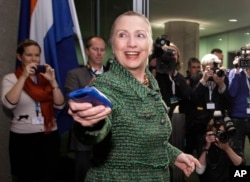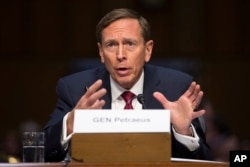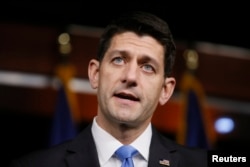The U.S. State Department is reopening an internal investigation into whether Democratic presidential candidate Hillary Clinton and her top aides mishandled classified information when she was secretary of state under President Barack Obama.
"We will aim to be as expeditious as possible, but we will not put artificial deadlines on the process," department spokesman John Kirby said, noting that the internal review can proceed now that the Justice Department investigation wrapped up with no charges filed against Clinton.
The move comes a day after Attorney General Loretta Lynch agreed with the FBI recommendation that no criminal charges should be filed in relation to the incident.
Republicans, including Clinton's White House rival Donald Trump, have cried foul over the lack of charges, alleging that Clinton's influence as a prominent politician helped her escape criminal proceedings.
Earlier Thursday, FBI Director James Comey defended his decision to not pursue a criminal case against Clinton, even though he said investigators found "great carelessness" in her use of private, unsecured email servers.
Comey told a House of Representatives panel that after a yearlong probe, investigators decided there was no evidence that either Clinton, now the presumptive Democratic presidential nominee, or her aides intended to break U.S. laws against the disclosure of classified materials. The investigators found 113 classified documents in the more than 30,000 Clinton emails they reviewed from her 2009-2013 tenure as the country's top diplomat.
Why Clinton was not charged
Comey also said that it would have been inappropriate to charge Clinton, seeking to become the first U.S. female president, under a 1917 U.S. law making "gross negligence" a crime. He said that the law had only been used once, to bring charges in an espionage case, and that Justice Department prosecutors "have grave concerns whether it's appropriate to prosecute someone for gross negligence."
Comey's testimony came two days after announcing that investigators had concluded no criminal case should be brought against Clinton, a recommendation Attorney General Loretta Lynch accepted Wednesday, ending the case without any charges against Clinton.
Clinton, who has yet to comment on the FBI's findings that she and her colleagues were "extremely careless" in the handling of the classified material, answered questions from FBI investigators for 3 1/2 hours last Saturday. Comey said there was "no basis to conclude that she lied to the FBI."
'Mystified and confused'
Republican Congressman Jason Chaffetz, the panel's chairman, said he was "mystified and confused" by how the FBI could find that Clinton mishandled dozens of classified documents and then not be criminally charged. "If your name is not Clinton," Chaffetz said, "or you're not part of the powerful elite, then Lady Justice will act differently. Hillary Clinton created this mess."
FBI Director Comey testified in the midst of the highly charged national presidential campaign, with Clinton set to face off with the presumptive Republican nominee, billionaire real estate mogul Donald Trump, in the November national election to pick the successor to President Barack Obama, who leaves office in January.
But Comey said the investigators conducted their investigation "in an apolitical and professional way." The FBI chief said he concluded that "no reasonable prosecutor" would bring a case against Clinton.
Republicans on the panel noted sharp differences in Clinton's past comments on her use of the private email server and handling of the classified material from what the FBI investigators found. The FBI determined that over four years as secretary of state, she used multiple servers positioned at her New York home, not just the one she has acknowledged.
Democrats support decision
Democrats on the panel did not defend her email practices or question the FBI findings, but rather noted that her conduct did not reach that in another celebrated U.S. national security document case, when former CIA chief David Petraeus acknowledged he leaked eight folders of secret documents to a woman who was his lover and writing a biography about him.
Comey said Petraeus' conduct was "clearly intentional" while Clinton's was not.
When her use of a private email system first came to light more than a year ago, Clinton claimed she used one phone for both government and private emails for "convenience," which Comey said the FBI agreed with.
But Clinton later acknowledged use of the single email system was "a mistake," leading to the FBI investigation.
Comey said the FBI, after the lengthy investigation, concluded that Clinton was not "particularly sophisticated" in the use of electronic information.
"Good grief," remarked Republican Congressman Ron DeSantis.
Attempt to block Clinton from intelligence info
But in the aftermath of the FBI findings about Clinton's email records, Speaker Paul Ryan, leader of the Republican-controlled House, called on Director of National Intelligence James Clapper to block Clinton from receiving the national security briefings. Ryan said blocking her from the intelligence information "certainly constitutes appropriate sanctions."
Ryan said if Clapper refuses the request, he wants the intelligence chief to provide his rationale for giving Clinton the information "despite the FBI findings."
House Democratic leader Nancy Pelosi dismissed the Republican complaints about the FBI's decision against prosecuting Clinton.
"We have an investigation of the investigation of the investigation," she said. "How long can this go on?"
Comey's testimony occurred a week after a political uproar over an encounter Clinton's husband, former President Bill Clinton, had with Lynch, the country's top law enforcement official, on an airport tarmac in Phoenix, Arizona. Both Bill Clinton and Lynch said they chatted for half an hour, although not about the email case, but subsequently regretted doing so while Lynch was overseeing the email investigation.
Trump denounces FBI decision
Trump has denounced the no-prosecution decision, saying at one point on Twitter, "FBI director said 'Crooked Hillary' compromised our national security. No charges. Wow! Rigged System."
Well after Clinton left office in early 2013, she deleted about 30,000 emails she and her lawyers deemed to be personal and turned another 30,000 official government-related emails over to the State Department, as she was required to do in any event because of government record-keeping regulations. But Comey said thousands more emails were discovered as well.
Clinton said she never sent or received emails that were marked as classified documents. But Comey said FBI investigators found that 110 emails in 52 email chains contained classified information at the time they were sent, with eight of the chains having top secret information in the emails she turned over to the State Department. Three other emails with classified information were found in the additional emails.
Were Clinton emails hacked?
Comey said investigators do not believe that Clinton's emails were hacked by hostile, foreign interests. However, he said "hostile actors" gained access to private commercial interests that Clinton corresponded with and that her extensive use of personal email outside the United States and in the territories of "extensive adversaries" makes it possible they gained access to her personal accounts.









